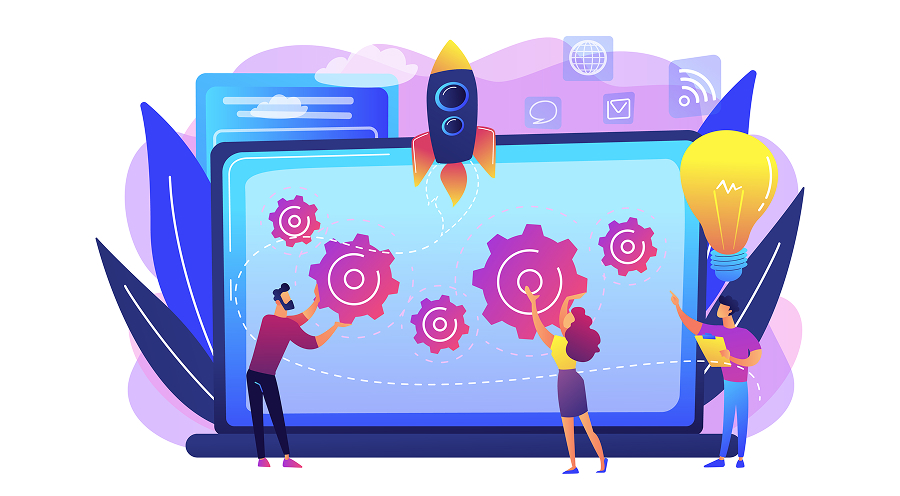In today’s high-speed digital economy, website performance optimization is no longer a luxury-it is a necessity. We understand that user expectations have evolved rapidly. Visitors now demand fast, responsive, and personalized online experiences. At the heart of this transformation lies Artificial Intelligence (AI), a powerful tool reshaping how we enhance, monitor, and scale website performance.
You may easily transform your performance optimization strategy by embracing artificial intelligence (AI). Manual optimization is laborious, draining, and prone to human mistake, which might make your work less successful. You can easily improve user experience, increase engagement, drive conversions, and get past the obstacles that impede website performance when you have knowledgeable AI consultancy on your side.
We’ve emphasized the significance of keeping an eye on website performance, important variables, and AI’s potential in relation to these variables in this piece.
1. Website Speed and Performance: What Are They?
Website performance is influenced by various aspects, one of which is website speed. While there are differences in website speed and performance, they remain together and have a direct effect on user engagement, contentment, conversions, and SEO rankings.
- The effectiveness of a website’s operation for its users is referred to as its performance.
- A well-performing website has features like responsive design, intuitive navigation, and an ideal load speed.
- A website’s speed is the amount of time it takes for the server to load and show up in a user’s browser.
- Time to first byte (TTFB), render time, and page load time are some of the variables that are used to determine how long it takes for a website to load.
A Few Brand Case Studies on Artificial Intelligence Performance Optimization
Pinterest is a well-known social networking site that leverages artificial intelligence (AI) to improve user experience by providing visual search capabilities, personalized content suggestions, and much more.
When eBay, the world’s largest online marketplace, incorporated AI technology, its average click-through rate increased by 31%.
2. Why is the performance of a website important?
Additionally, no business owner would ever wish to provide their clients such a bad experience. They take great care to choose the entrance to the store, paint the walls, apply wall decals, choose cozy workstations, and use eye-catching coffee mugs that entertain and excite customers.
With websites, it’s exactly the same.
A website with bad performance soon loses users. In contrast, users may enjoy a website with an ideal performance score. Below are some advantages of website performance.
- Lower the bounce rate.
- Increase the retention rate of users
- Make your SEO ranks better
- Increase the engagement of users
- Enhance the experience for users
- Make sure the navigation runs smoothly.
- Deal with heavy traffic
- Increase the usability of
- Increase communication on mobile devices
Website performance is the primary determinant of the Core Web Vitals rating, which was updated by Google’s algorithm. It highlights the need for an average performance score of 90 or above.

3. Elements Influencing Website Speed and Performance
Anything that makes your users grin is good website performance, as we explained in the previous section. Accordingly, the speed at which a website reacts when a user submits a form, purchases a product, scrolls through a page, clicks a button, and so on are all factors that affect how well a website performs.
Understand the various things that prevent websites from operating efficiently before learning how AI can help with website speed and performance.
Web Design & Development
- Overuse or unnecessary use of HTML, CSS, and JavaScript scripts
- Using media files with high resolution
- No list of suitable file formats
- Absence of the sluggish loading feature
- Duplicated or redundant code
- Superfluous database queries
- Excessive plugin usage
- Several requests to the server
- The feature that is not responsive
Caching
- Disabling browser caching
- Disabling server caching
- CDN cache that isn’t optimized
- Unoptimized caching
Third-party extensions
- HTTP requests to external servers have increased.
- Incompatibility with components from external parties
- Downtime of external servers, code effectiveness, and quality
Web Hosting
- High downtime of the server
- Slow server performance
- Insufficient resources
- Slow bandwidth
- Lack of CDN
- PHP version, database server, and web server deconfiguration
Responsiveness
- Web design that is not responsive
- Media size that is not optimized
- A large volume of server requests
- Huge JavaScript and CSS files
- turned off browser caching
- Lack of appropriate CDN implementation
Traffic Volume
- A greater quantity of requests being made at once
- Too few server resources
- Changing to a more expensive hosting package
- Increasing the number of servers in a server cluster
- Making use of cloud-based web hosting
- Not dividing up incoming traffic over several servers
- Not paying enough attention to the traffic
Server Performance
- Unoptimized server load balancing
- Inadequate server configuration and settings
- Ineffective caching system
Performance on websites includes more than just load time and page speed. It involves a lot of elements that need to be considered.
Check this out: Best Ways to Speed Up WordPress Site and Slow Admin Dashboard

4. How Does Artificial Intelligence Help?
It entails ongoing attention to detail in order to identify coding errors, optimize media file sizes, and take care of other aspects that affect website speed.
The performance of your website as a whole may suffer if you overlook any important component. Website experts can concentrate on more complex optimizations and strategic decision-making to further improve the overall performance of their websites when AI takes care of performance-related chores.
AI technologies are effective at automating procedures, continuously observing performance problems, and proactively looking for remedies.
Personalization
AI may examine user activity to learn about their surfing habits, interests, and preferences. In order to generate comprehensive user profiles, AI algorithms collect data such as browsing history, demographics, purchasing history, and interaction behaviors.
AI can promote relevant material, customize the user interface for each user, and make tailored recommendations thanks to these profiles. The layout, color scheme, font size, and even language may need to be changed in light of the user’s prior interactions or preferences.
Automation
- Optimize Media Files: Examine media files, such as pictures and videos, to minimize their size without sacrificing quality, especially for pages with a lot of material.
- Ensure Responsiveness: Verify that the website works and shows correctly across a range of screen configurations by simulating user interactions.
- Monitor Website Speed: Slowdowns and bottlenecks that impact the ideal speed of a website are automatically detected, and areas that need improvement are sought after.
- Detect & Fix Coding Errors: Examine the code of websites to identify possible coding issues as quickly as possible. Automatically identify troublesome areas, suggest solutions, or even carry them out yourself.
Fraud Detection & Security
detects a range of online security risks, including malware, hacking attempts, and fraudulent activity. In order to spot suspicious activity and possible security threats, artificial intelligence (AI) algorithms use sophisticated approaches to examine patterns, behaviors, and abnormalities in real-time data.
AI-powered solutions keep an eye on user interactions, system logs, network traffic, and other pertinent data sources in order to spot any unusual activity or trends that might point to a security breach. AI quickly identifies and flags questionable activity by evaluating this data in real-time.
Data & Predictive Analysis
The ability to collect and evaluate large amounts of data about website performance is made possible by AI tools’ proficiency in data analysis. Metrics, user activity, and other pertinent data are included. AI systems can forecast consumer preferences, predict user behavior, and optimize different website parts by examining past data.
Insights that may be difficult for human observers to perceive can be extracted by AI systems from intricate patterns and user interactions. Website owners and marketers save time and effort by not having to manually set up and analyze A/B testing thanks to this automated method.
A/B Testing
AI systems automatically generate several iterations of webpages or particular components, such headlines, calls to action, graphics, and so forth. These variations are shown to various website visitor segments, and each visitor is assigned to one of the versions at random. The user interactions, engagement data, and conversion rates linked to each version are then examined by AI.
The best design, layout, content, and overall version in terms of user engagement and conversion metrics can be identified by AI algorithms through the collection and analysis of this data.
Conclusion
AI is rapidly transforming how websites are optimized for speed and performance. From automating image compression to predicting user behavior, it offers tools that streamline processes and boost loading times. Embracing Artificial Intelligence in your web strategy can lead to faster, more efficient sites and better user experiences. Start exploring AI-powered solutions today to stay competitive and meet modern performance expectations.
At InCreativeWeb, we utilize AI-driven solutions to optimize load times, reduce server strain, and streamline user experience. We fine-tune code, compress media intelligently, and implement smart caching techniques for faster browsing. Our experts ensure your site scores high on Core Web Vitals for SEO and user retention. With our personalized performance audits, we identify hidden issues and apply precision-based enhancements. Connect with InCreativeWeb now — let us optimize your site for speed and conversions.
Author
Jayesh Patel
Jayesh Patel is a Professional Web Developer & Designer and the Founder of InCreativeWeb.
As a highly Creative Web/Graphic/UI Designer - Front End / PHP / WordPress / Shopify Developer, with 14+ years of experience, he also provide complete solution from SEO to Digital Marketing. The passion he has for his work, his dedication, and ability to make quick, decisive decisions set him apart from the rest.
His first priority is to create a website with Complete SEO + Speed Up + WordPress Security Code of standards.